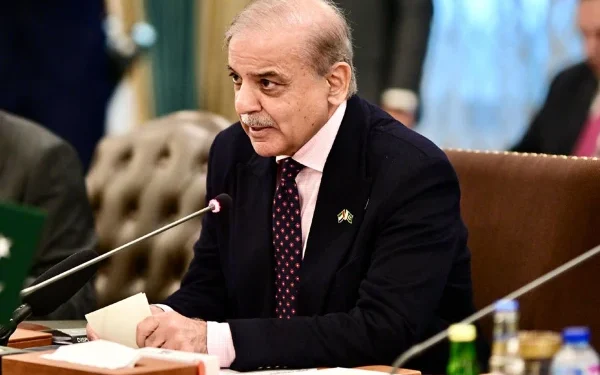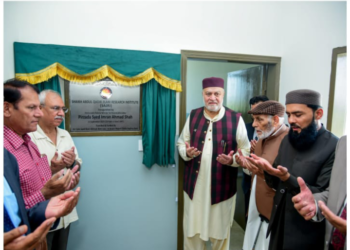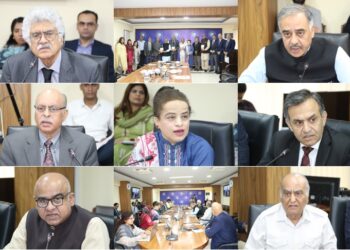Islamabad Meeting Focuses on Diamer-Bhasha Dam and National Water Resources
Islamabad – Prime Minister Muhammad Shehbaz Sharif has reiterated the vital importance of cheap electricity and a robust agricultural sector for achieving Pakistan’s economic self-reliance. Speaking during a high-level meeting on the Diamer-Bhasha Dam and other strategic water resource projects, the Prime Minister emphasized that the timely construction of new dams is critical for ensuring energy security, agricultural sustainability, and flood prevention.
The meeting, held in the federal capital, brought together key stakeholders and senior government officials from various ministries to evaluate the progress and challenges in the construction of the Diamer-Bhasha Dam, one of Pakistan’s largest and most strategically important infrastructure projects.
Strategic Importance of Diamer-Bhasha Dam
A Game Changer for Pakistan’s Water and Energy Crisis
The Diamer-Bhasha Dam, located on the Indus River in the Gilgit-Baltistan region, is one of the most ambitious water and energy projects ever initiated in Pakistan. Once completed, the dam will have a gross storage capacity of 8.1 million acre-feet (MAF) and a power generation capacity of 4,500 megawatts (MW).
The dam is expected to play a transformative role by:
- Significantly increasing Pakistan’s water storage capacity
- Enhancing irrigation potential for millions of acres of farmland
- Providing low-cost and clean hydroelectric power
- Helping mitigate floods in downstream regions during the monsoon season
Prime Minister Shehbaz Sharif underscored that Pakistan’s long-term prosperity depends on such mega-infrastructure projects, which address the twin challenges of energy shortfall and water scarcity.
High-Level Meeting: Focused Leadership and Coordination
The meeting, chaired by Prime Minister Sharif, was attended by several federal ministers and key policymakers, reflecting the multi-sectoral importance of the project. Among the prominent attendees were:
- Federal Minister for Planning, Ahsan Iqbal
- Federal Minister for Kashmir Affairs and Gilgit-Baltistan, Engineer Amir Muqam
- Federal Minister for Law and Justice, Azam Nazir Tarar
- Federal Minister for Water Resources, Moin Wattoo
- Advisor on Political Affairs and Inter-Provincial Coordination, Rana Sanaullah
- Chief Minister of Gilgit-Baltistan, Gulbar Khan
- Senior government officials and project stakeholders
The meeting reviewed progress reports, project timelines, and administrative bottlenecks affecting the dam’s construction.
PM’s Directives: Remove Hurdles, Prioritize Completion
During the session, the Prime Minister issued clear directives to remove all administrative, financial, and legal obstacles delaying the dam’s progress. He emphasized that no compromise should be made on project timelines, and urged speedy resolution of land acquisition, security, and compensation-related issues.
“The construction of Diamer-Bhasha Dam is not just a project; it is a national mission. We must complete it as a top priority,” said Prime Minister Shehbaz Sharif.
He also instructed relevant ministries and the Water and Power Development Authority (WAPDA) to coordinate closely and submit monthly progress reports to his office.
Water Storage: Vital for Agriculture and Food Security
The Prime Minister highlighted the interconnectedness of water availability and agricultural productivity. He pointed out that increasing water storage capacity is essential to protect crops from erratic climate patterns, ensure year-round irrigation, and boost food production.
Agriculture: The Backbone of Pakistan’s Economy
Agriculture remains the largest source of employment in Pakistan, employing over 38% of the workforce and contributing about 19% to the GDP. However, the sector suffers from:
- Inefficient water use
- Over-reliance on canal systems vulnerable to seasonal fluctuations
- Depleting groundwater reserves
- Lack of water storage infrastructure
With climate change causing unpredictable rainfall patterns and more frequent droughts, the construction of large dams is being seen as a strategic necessity.
Cheap Electricity: A Path to Economic Stability
Prime Minister Sharif reiterated that affordable electricity is the key to industrial growth, business competitiveness, and reducing inflation for the average citizen.
Currently, Pakistan relies heavily on imported fossil fuels, which drive up energy costs and create a massive burden on the national exchequer. The rising costs of LNG, coal, and oil imports have made energy unaffordable for many, leading to frequent power outages and unsustainable circular debt in the power sector.
Hydropower as a Sustainable Alternative
The Diamer-Bhasha Dam, with its hydropower capacity of 4,500 MW, is expected to provide clean, renewable energy, significantly reducing Pakistan’s dependence on imported fuels.
“Economic self-reliance cannot be achieved without cheap electricity. Hydropower is our only sustainable and long-term solution,” said the Prime Minister.
Flood Prevention and Climate Resilience
Another critical benefit of the dam is flood control. The Prime Minister stated that recent flood disasters, especially the 2022 monsoon floods that devastated large parts of Sindh, Balochistan, and South Punjab, underscored the urgent need for better water management.
National Resilience Through Infrastructure
Floods not only damage infrastructure and agriculture but also displace millions of people, straining public resources. A dam like Diamer-Bhasha will serve as a buffer during extreme rainfall, storing excess water and reducing the risk of downstream flooding.
Employment and Regional Development
The construction of the Diamer-Bhasha Dam is expected to create thousands of jobs, especially for the local population in Gilgit-Baltistan and Khyber Pakhtunkhwa, where the dam is located. This will stimulate local economies through infrastructure development, service industries, and supply chain activities.
The Prime Minister urged the relevant authorities to prioritize the hiring of local workers and contractors, ensuring that the benefits of the project are shared with the local communities.
Public Trust and National Vision
Shehbaz Sharif emphasized that mega-projects such as the Diamer-Bhasha Dam represent a vision of national unity and long-term planning. He called upon all political parties, institutions, and citizens to support the initiative beyond partisan lines.
“We need national consensus on development. This dam is not for one province or one government—it is for future generations,” he said.
Conclusion: Strategic Dams Key to Pakistan’s Future
The meeting concluded with a renewed commitment to accelerate work on the Diamer-Bhasha Dam and similar infrastructure projects aimed at ensuring water security, energy independence, and economic stability.
As Pakistan faces growing challenges related to climate change, energy crises, and food insecurity, the government sees large-scale hydropower projects as the backbone of its economic revival strategy.
With strong political will, coordinated planning, and timely execution, the Diamer-Bhasha Dam may well become a symbol of Pakistan’s resolve to secure its future through self-reliance and sustainable development.

























